Navalny’s “Smart Voting” election campaign undermined by fake apps and Telegram channels
Apps and Telegram channels impersonated their pro-Navalny counterparts, potentially redirecting voters away from strategic voting advice
Navalny’s “Smart Voting” election campaign undermined by fake apps and Telegram channels
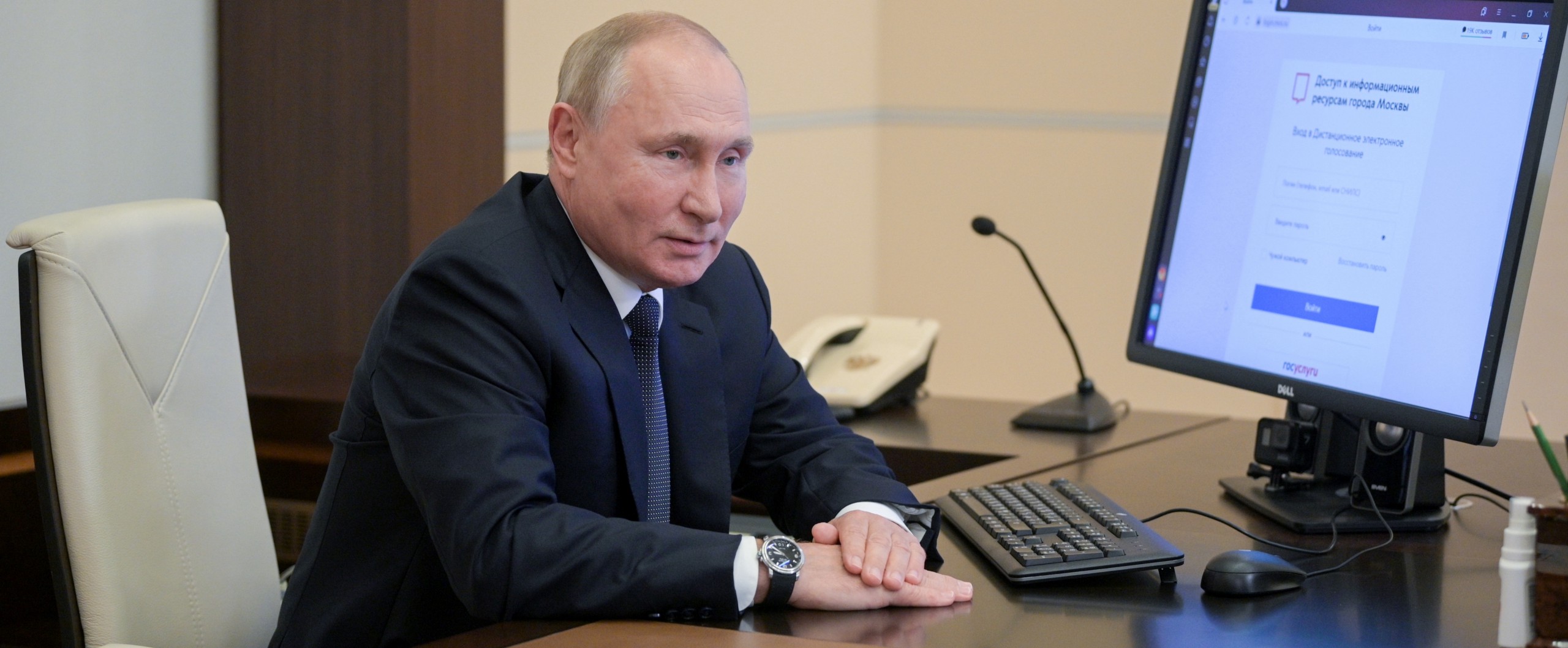
Banner: Russian President Vladimir Putin sits in front of a computer in Moscow while taking part in a remote electronic voting on the first day of the three-day parliamentary election, September 17, 2021. (SOURCE: Sputnik/Alexei Druzhinin/Kremlin via REUTERS)
By Eto Buziashvili
Imprisoned opposition leader Alexei Navalny and his team found their Smart Voting electoral campaign targeted by Russian authorities, Telegram channels, and counterfeit mobile apps designed explicitly to be mistaken for those related to his tactical voting campaign. These activities took place prior to Apple and Google’s controversial decision to remove the Smart Voting app from their app stores in Russia.
Russian President Vladimir Putin has long sought to retain power indefinitely, including by having a largely subservient parliament pass a law that bypassed the term limits he would otherwise reach in the 2024 presidential electoral cycle. Many of his most prominent critics have been imprisoned or have died, often under mysterious circumstances. Navalny is perhaps his most famous (and still living) critic, and was himself the subject of an assassination attempt, which independent experts hired by the United Nations have linked to the Russian state.
Navalny started his rise to prominence after he was elected to head the council of opposition leaders in 2012. His Anti-Corruption Foundation (FBK in Russian) quickly became a thorn in Putin’s side, as it undertook a program of exposing corruption within Putin’s government. Eventually, it earned the designation of being labeled by Putin’s government as a “foreign agent” in 2019 and “extremist” in June, both of which allow the government to treat it as hostile and limit its domestic operations. Prior to parliamentary elections , Navalny’s “Smart Voting” tactical voting program increasingly found itself the target of Kremlin efforts to throttle the possibility of significant opposition success.
On September 6, 2021, Russian media regulator Roskomnadzor blocked access to the official “Smart Voting” website. On September 17, the first day of the three-day voting period, Apple and Google removed the Smart Voting app following threats from Russian authorities that the companies’ local employees would be subject to prosecution.
But these were not the only efforts made to throttle the Smart Voting campaign. In May 2021, a Moscow court ordered Google and Russian search engine Yandex to eliminate the term “smart voting” from their search results.
Intriguingly, the campaign was also targeted on Telegram and in app stores, where doppelgänger channels and apps impersonated their official Smart Voting counterparts to confuse and mislead potential voters. While impersonation, broadly speaking, is not a new or rare phenomenon—the latest election cycle featured three identically named and similar-looking men running for office in St. Petersburg, with two of them attempting to cannibalize votes from the third candidate, opposition figure Boris Vishnevsky — the impersonation of official opposition campaign tools potentially undermined voters by keeping them away from valuable information on how to support the opposition by voting strategically.
The DFRLab previously covered attacks on Navalny, including when inauthentic Instagram accounts with AI-generated faces targeted protests in support of Navalny and when Facebook removed an inauthentic network connected to Putin’s United Russia party.
Restricting access to the Smart Voting official website
On September 6, 2021, Roskomnadzor blocked access to Navalny’s official Smart Voting website, through which citizens were previously able to learn how to vote strategically against pro-Putin candidates. Prior to that, in July 2021, Roskomnadzor had also blocked access to Navalny’s personal website as well, accusing him of instigating extremist activities.
Using social media monitoring tool BuzzSumo, the DFRLab compared social media engagement on the top three most-engaged stories driving traffic to the Smart Voting website, in the two weeks before and the week follow the September 6 ban Prior to the September 6 ban, the highest-ranked story linking to the app achieved as many as 7,900 social media engagements; following the ban, the highest-ranked story reached less than 500 social media engagements.

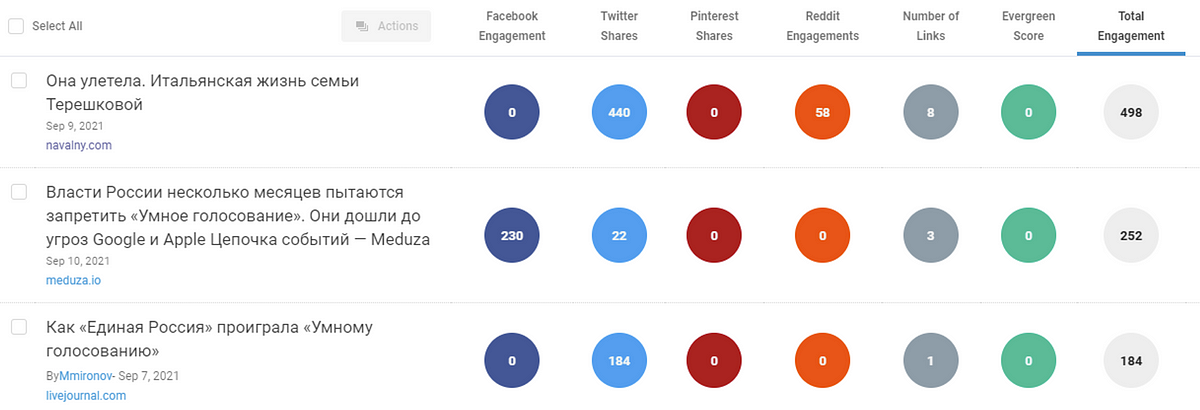
In an typical democratic election season, voters tend to become increasingly engaged in the overall dynamics of the race as the election itself draws closer. This would indicate that traffic to and engagement with stories about the election would go up as interest also rises; therefore, this drop in engagement suggests a possible effect of the undemocratic actions of the Putin government and its attempt to stifle the opposition by blocking its website.
Telegram channels designed to deceive
Created on September 1, 2019, the Navalny-affiliated Smart Voting Telegram channel had 3,217 subscribers as of September 13, 2021, and featured only a single post pointing users toward the official Smart Voting website and the related “Smart Voting (bot)” channel, the latter of which helped voters choose opposition candidates to “unite to fight the monopoly” of Putin’s United Russia party.
These two channels, however, had to contend with the Telegram equivalent of doppelgängers — a pair of fake channels likely intended to deceive voters into believing they were the official versions. These nearly identical channels featured similar names and profile icons.
The two fake channels, Разумное голосование (“Reasonable Voting”) and its corresponding bot, were both created on September 5, 2021, one day prior to Roskomnadzor blocking access to Navalny’s official Smart Voting website. Their names in Russian are highly similar to those of the Navalny-affiliated channels — the difference in Russian is a matter of three alphabetical characters, with “reasonable” (“Разумное”) having three additional characters (“Раз”) preceding the exact same characters of “smart” (“Умное”). Separately, the logos of the impersonator channels were designed to mimic those of the official channels, which featured the Smart Voting campaign’s well-established logo.
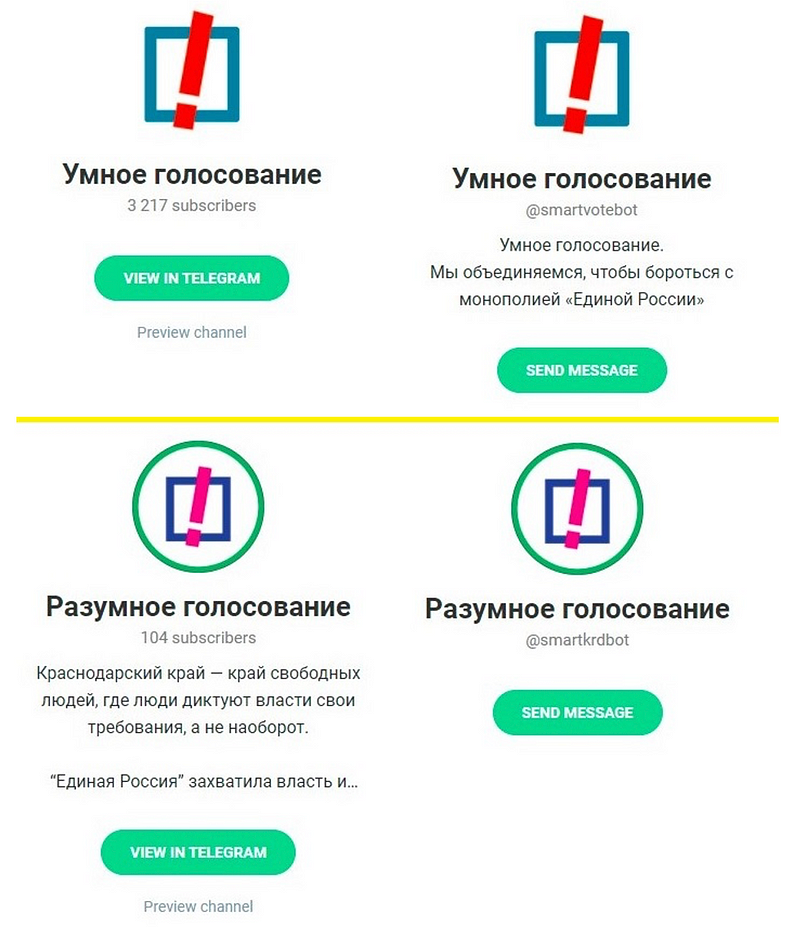
In its description, the primary doppelgänger channel states that it was created in the “federal subject,” or territory, of Krasnodar Krai in southwestern Russia; that “United Russia” has seized power; and that subscribers should do everything to prevent Putin’s party from being reelected. In one of its two posts prior to the election, the channel promoted its accompanying fake bot channel and urged Telegram users to elect “the most worthy candidate” over Putin’s preferred candidates. While the official Smart Voting bot channel was programmed to explain tactical voting strategy, asking subscribers to reply with their address to receive advice on whom to vote for based on their location, fake bot channel featured no interactive functionality.
It is unclear who was behind these impersonating channels or what their motive was, but it is likely the channels were designed to imitate the official versions in order to detour potential voters away from the official campaign channels.
Mobile apps designed to be mistaken for the official versions
Telegram was not the only platform where Navalny’s voting efforts were impersonated. A similar tactic was evident in both the Apple and Google app stores for smartphones. Before it was removed under threat from Russian authorities, the official “Навальный” (“Navalny”) app provided information about how to vote tactically and about the Smart Voting strategy more broadly. In the information section of the app, Navalny’s team appeared as the copyright owner, and identified Roman Rubanov, former head of Navalny’s Anti-Corruption Foundation, as the app developer. The last update to the app, made on September 13, 2021, highlighted that the Navalny team “continues to improve the system for bypassing its blocking,” as translated from Russian.
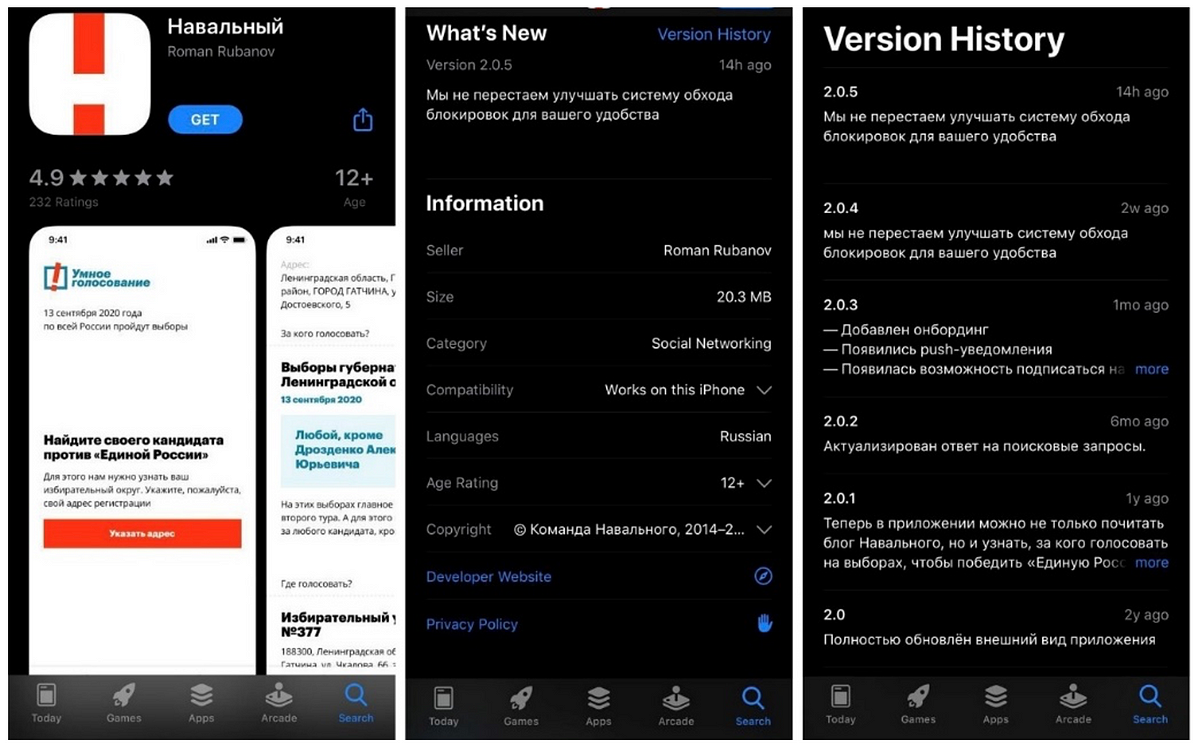
When searching for “Навальный” in the app store, however, the query returned another app titled “Умное голосование” (“Smart Voting”) appropriating both the campaign name and official logo.
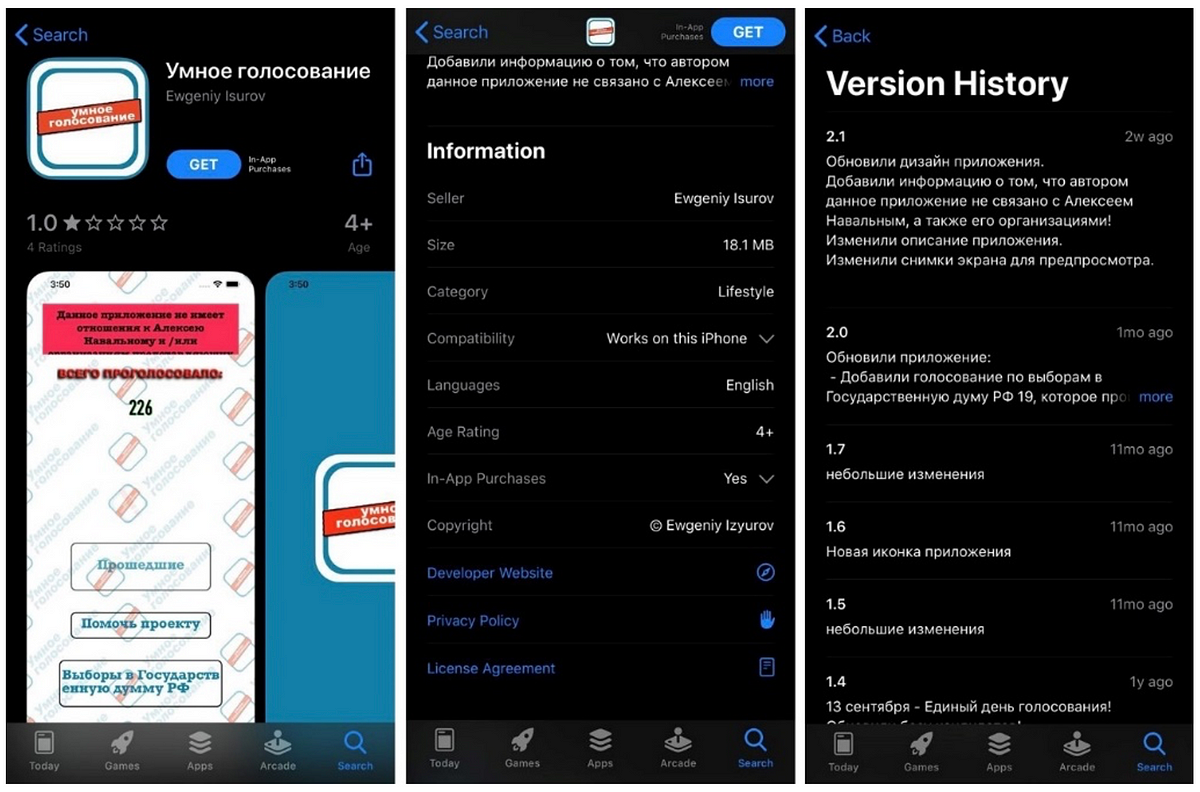
In the impersonating app’s information section, “Ewgeniy Izurov” was listed as the copyright owner. Izurov appears to have developed several apps focused on non-political topics such as games, finance, and health, but a Google search of his name returned no results beyond these apps.
At the time of writing, the most recent update to the fake Smart Voting iPhone app took place on September 1, 2021, when the app profile was updated to say that was not affiliated with either Navalny or his campaign. Even though the ersatz “Smart Voting” app’s history dates back two years, this clarification was only made two weeks before the election. On August 30, 2021, a day before the clarification was made, app store users started to give the app one star ratings and leaving comments about its fake nature, including highlighting that the official Smart Voting app is actually called “Navalny.”
This acknowledgment by the fake app, however, did not dissuade Russian state news agency RIA Novosti from publishing an article on September 9 in which it connected the fake “Smart Voting” app to Alexei Navalny and his campaign. It claimed the app was not protected from personal data leaks and that team Navalny constantly experienced such leaks. In other words, the RIA Novosti piece not only directed readers to the wrong app, it also attempted to discredit all of Navalny’s online campaign tools and stoke their fears that their personal data is not safe while interacting with with the campaign online.
The fake “Smart Voting” remained available through at least September 17, 2021, the day the app stores blocked access to the official app in Russia. By September 20, it was unavailable. It is unclear, though, whether it was removed by the app stores themselves or by the developer. Oddly enough, despite the fake app’s disappearance from the stores, Izurov’s app store page still offers a “Smart Voting” iMessage app, where users can access fake Navalny campaign stickers for the bargain price of 99 cents.
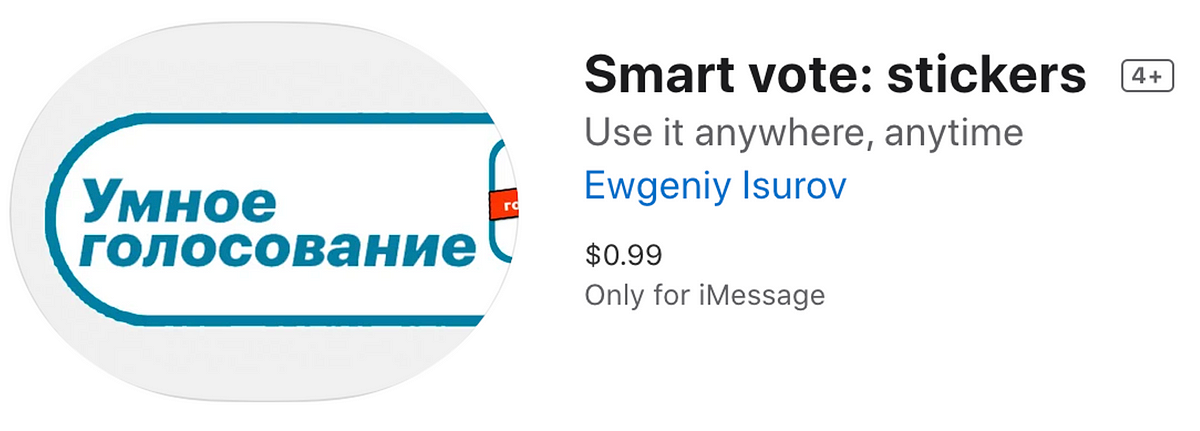
As the September 2021 election drew closer, the Putin regime sought to undermine the opposition — and key opposition figure Alexei Navalny and his Smart Voting campaign in particular — as a means of securing electoral victory, despite having nearly complete control of the electoral system. Any activity that restricts the already limited reach of opposition electioneering — from direct actions such as blocking official websites and forcing the removal of official resources like the Navalny app, to possibly unrelated but supportive activities such as Telegram and smartphone apps that impersonate opposition efforts — benefits the entrenched regime.
On September 20, Russia’s Central Election Commission announced that Putin’s United Russia party had retained its supermajority in the Duma.
Eto Buziashvili is a Research Associate, Caucasus, with the Digital Forensic Research Lab.
Cite this case study:
Eto Buziashvili, “Navalny’s ‘Smart Voting’ election campaign undermined by fake apps and Telegram channels,” Digital Forensic Research Lab (DFRLab), September 21, 2021, https://medium.com/dfrlab/navalnys-smart-voting-election-campaign-undermined-by-fake-apps-and-telegram-channels-ef0f0ac8f75a.
Follow along for more in-depth analysis from our #DigitalSherlocks.

